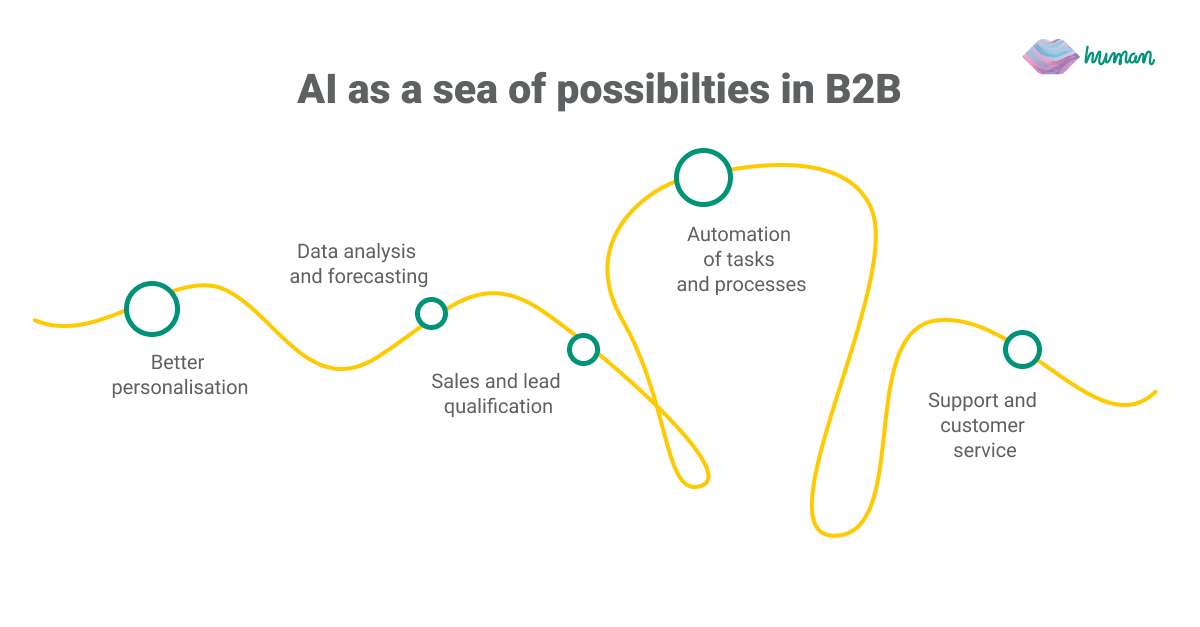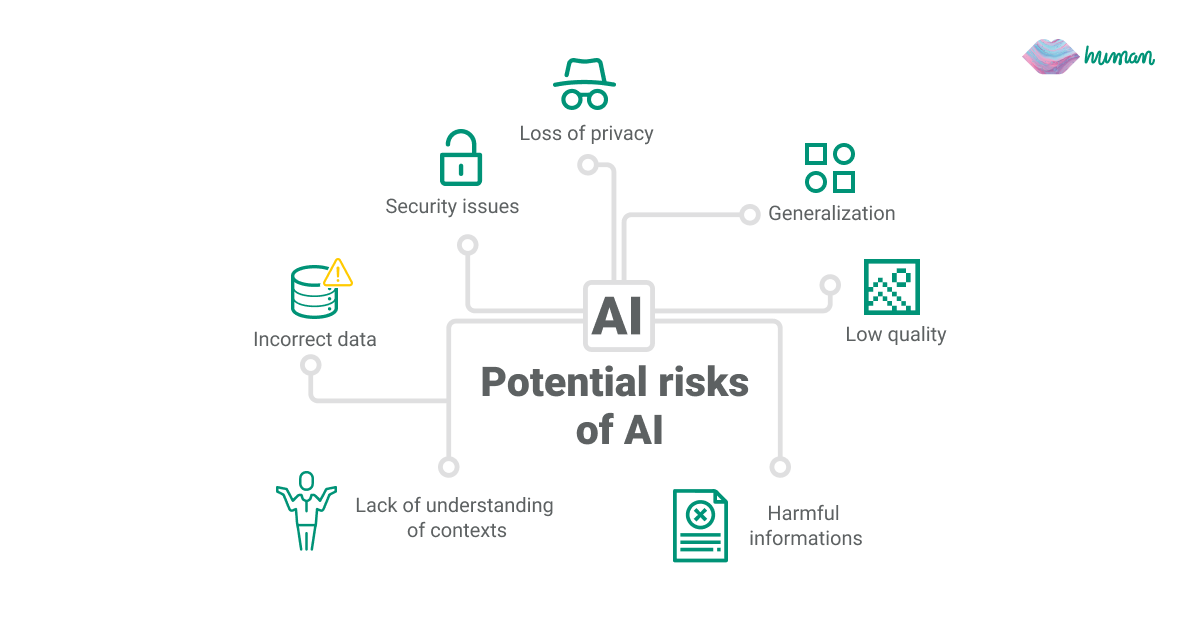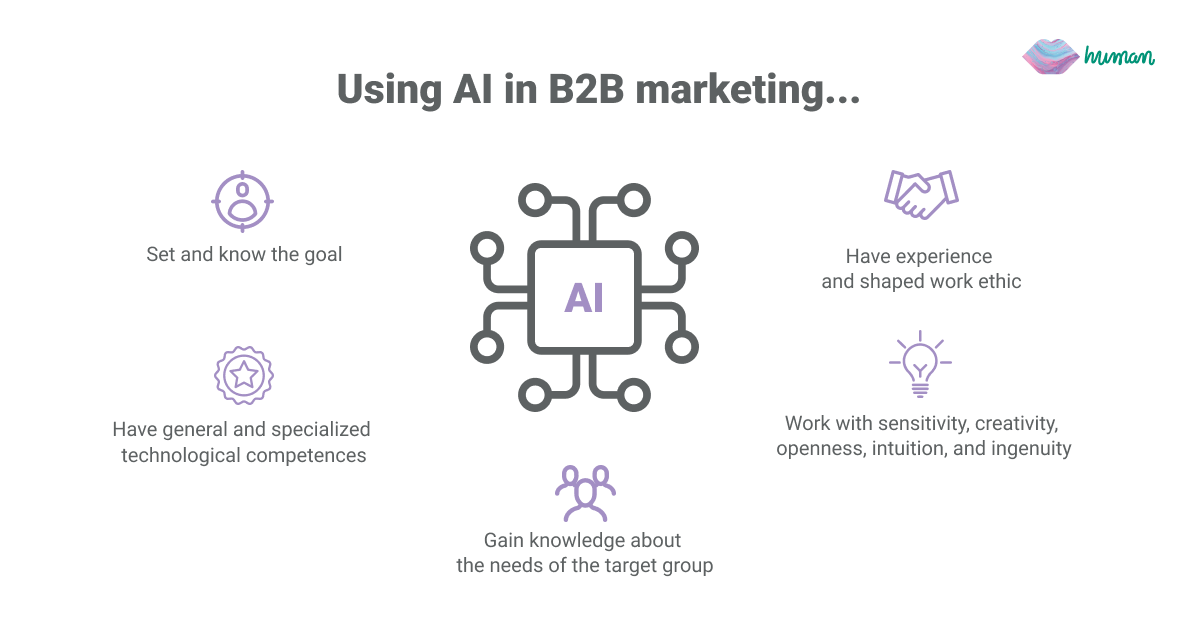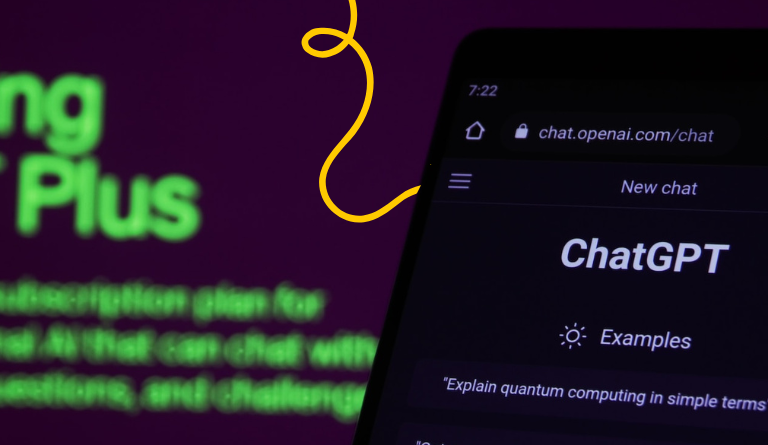AI as a Holy Grail – the technological promise for businesses
The playing field is poised to become a lot more competitive, and businesses that don’t deploy AI and data to help them innovate in everything they do will be at a disadvantage. – Paul Daugherty
Just a few months ago, AI available at the reach of the average Internet user was mainly associated with Midjourney and the ability to generate graphics based on prompts uploaded to Discord.
After short time, however, dozens of various tools flooded the web, and ChatGPT crossed the milestone of 1 million users within five days of its launch and over 100 million in February 2023 (Chat GPT data). AI took the world by storm and immediately stole the hearts of marketers, business owners and private users.
In the business area, it may be even tempting to use AI in times of crisis and hire it as a marketing manager.
Business users very quickly noticed the huge potential of AI tools in the area of building a competitive advantage. After all, you can’t ignore the general promises, such as:
- faster and better data analysis and predictive analysis, enabling more accurate business decisions and real-time responses in the form of precisely targeted marketing activities
- smooth process optimisation
- faster, automated reporting
- reducing marketing and operational costs
- as a result — obtaining a higher (ROI)
Therefore, I will briefly look at the business applications of AI and try to point out their pros and cons, focusing on the area of B2B marketing.
AI as a sea of possibilties in B2B
I think one of the most interesting things about automation isn’t on the practical side. I think it’s about creating magic and wonder and moments of splendor. – Genevieve Bell
The options for using AI in B2B marketing are staggering. It’s supposed to, among other applications, support marketing and sales teams in:
- Data analysis and forecasting – supporting decision-making processes thanks to data analysis, recommendations, and pattern detection.
- Competition and market analysis — thanks to the research support.
- Sales — lead qualification, CRM outreach management automation, or support in creating sales strategies
- Analysing databases and detecting patterns and trends — for example, to create the perfect customer profile
- Detection of irregularities in systems and technical problems — e.g., in the case of SAAS and applications
- Automation of tasks and processes in coordination, as well as marketing and sales teams
- Personalization of content for target groups – for example, in ABM campaigns
- Personalization of sales offers based on firmographics and ICP (ideal customer profile)
- Automation of creating and broadcasting advertising campaigns
- Support for copywriting and content scaling — e.g., creating product descriptions or supporting content cluster creation, recycling, and repurposing content with AI marketing tools.
- Customer service — for example, intelligent chatbots, ticket management, intelligent knowledge bases and customer feedback analysis
- Product development — e.g., support in concept generation, user research, roadmap planning, etc.
However, before we flip over the possibilities, we need to consider the general risks of working with AI in the work of a marketer.

AI as a chance with a lot of risks for all kinds of businesses
The first rule of any technology used in a business is that automation applied to an efficient operation will magnify the efficiency. The second is that automation applied to an inefficient operation will magnify the inefficiency. – Bill Gates
Should we entrust our tasks to AI entirely? When using AI in business, we must be very careful.
We are currently in beta – and we and our businesses are guinea pigs for AI startups and corporations. What are the risks of indiscriminately entrusting data to external tools, such as the free Chat GPT?
Loss of privacy and security issues regarding company data
We must be aware that when we use public tools, we run the risk of feeding the tools with sensitive data. Is ChatGPT safe? Well, it depends on how you use it. Quite recently, a Samsung employee shared secret information (code or meeting notes) with Chat GPT. Leaks have always happened – but the ease of AI use and the temptation to simplify your work can significantly increase the frequency of this type of incidents.
Providing incorrect or even harmful data and information
The creators of Chat GPT openly admit on their website that the chat “may occasionally generate incorrect information, occasionally produce harmful instructions or biased content and has limited knowledge of the world and events after 2021”. Unfortunately, situations like this happen.
During my tests, the obtained data was often outdated, incomplete, incorrectly combined, too generalized. This is visible in the case of generating various types of industry summaries and statements — in the case of websites, it often gives unsuitable or non-working websites. In addition, when we do not ask chat for sources – we will not receive them. The risk of taking the revelations revealed by AI for granted by a less aware user is growing.
BIAS- AI based on targeted data – with a specific focus on the topics of race, gender, politics, etc.
This problem may concern both the reliance on historical data containing manifestations of prejudices and stereotypes, e.g., racial or gender-related, but also the contemporary algorithms. This can also directly affect the information obtained – and thus the generated content and analyses.
For example, China has recently published a very valid list of bans on generative AI; among them are bans on promoting hatred, violence, inequality, terrorism, etc.
At the same time, Chinese AI is supposed to promote and uphold traditional socialist values. Therefore, the clash of AI suggestions or messages from different cultures can be extremely interesting. Compared to Chinese collectivism, Western tools may, for example, promote individualism more. What long-term consequences this may have for the content and suggestions generated by AI? We are yet to see.
Relying on large generalizations
Can you trust AI in a given field without having the competence to verify the quality and correctness of the generated content? We would like to be able to trust the machine to prepare the best possible solutions for us – hence, we compete in creating the most advanced prompts.
At the same time, during my tests regarding, for example, the quality of text summarization, it turned out that chat often makes huge, unjustified abbreviations, simplifications, and generalizations. It also loses context and meaning. Relying on information prepared by Chat GPT, both in business and education, may have long-term negative effects.
Flooding the web with generic, low-quality content
“Liberté, égalité, fraternité” — one would like to say. Finally, everyone can create, no matter if they have the competencies to do so. But should we enjoy it? On the contrary. As a result of the widespread availability of AI tools, we will probably face a flood of professionally prepared materials that in fact present low substantive value. Consequently, it can significantly lower the trust for broadcasters.
Creating and using content that violates copyrights
Can a photograph created thanks to midjourney, then polished in Photoshop, be called an original artwork? The discussion about what is true creativity and art in the context of AI is just beginning. Similar conversations and doubts will concern all types of text works, presentations, and creative concepts. AI solutions are already being developed to verify the work done by AI in terms of possible plagiarism. However, plagiarism is, de facto, just the tip of the iceberg. We need to discuss thought leadership here. Can we trust these self-proclaimed leaders whose expertise does not come from themselves, and instead, it’s a shell, generated by AI, perfectly packaged and precisely served?
Lack of empathy, sense, and understanding of contexts
AI is still just a tool in our hands. And, just like any other tool, it requires proper use and competence. The use of algorithms cannot replace human insight and empathy.
Admittedly, there are some indications of intelligence in the GPT4 chat. Strong progress in this area is visible in the work on the GPT5 chat, which can reach the General Artificial Intelligence Level, and thus the ability to learn and adapt just like a human. However, it doesn’t mean that AI will ultimately use these competencies in our best interest…

AI as a copilot, not the first pilot for B2B marketing teams
As more and more artificial intelligence is entering into the world, more and more emotional intelligence must enter into leadership. – Amit Ray
As a result of the above threats, we face a key potential risk of making wrong business decisions based on and using the above content.
We must be aware that in marketing work, especially for B2B purposes, AI can facilitate and shorten processes, but it will not replace real experience. An AI can be a collaborator – not a stand-alone employee – and certainly not a project manager.
As long as we still see the limits and we consciously use AI, and are not used by it, the race will be won by users and businesses able to use and harness the power of AI.
Using AI, especially in B2B marketing, it’s necessary to:
- Set and know the goal – you need to analyse the information collected so far, consider conditions and nuances, and, on this basis, set goals and make sure that all stakeholders understand them.
- Have general knowledge about the world, experience, and shaped work ethic – develop business, cultural, and social competences to understand business and navigate its meanders.
- Gain specialist knowledge in the field in which we create content or inquiries and develop research competencies to assess the quality and correctness of the received data.
- Have general and specialized technological competences – they build awareness of the limitations of the AI to better construct queries within a given tool and use its potential.
- Have empathy which is necessary to extract company and industry contexts that are often hidden between words or in the experiences of employees and their observations – and only a personal conversation can bring them out.
- Gain knowledge about the needs of the target group – many insights and hidden motivations can only be extracted in a direct conversation – when creating ICP. Such knowledge can be supplemented with automated analyses concerning, for example, statistics, but their quality and correctness must be verified and related to the human context.
- Work with sensitivity, creativity, openness, intuition, and ingenuity – allowing you to maximize the benefits of using AI by developing, adapting, and modelling the obtained content.

Perversely, I will start with actions that are debatable in terms of ethics – but you need to be aware of them. It is about all types of tools for automating cold mailing, allowing you to speed up the entire process – from scraping addresses to automating the generation of personalized messages based on scrapped knowledge about the user (and even personalized video recordings).
It is worth remembering that more and more broadcasters will use these types of tools. The fight for the recipient’s attention will be merciless. The competition is getting bigger and bigger, while the demand and interest of users are still falling.
All the more, the virtuosity in creating advertising messages, achievable thanks to AI tools, must be backed by real value – real quality, real benefit, real offer, and real people. The facade created thanks to AI can be quickly verified.
Undoubtedly, however, there is space for the wise use of tools as everyday co-pilots in B2B marketing in areas such as:
- Support automation for everyday tasks – there are already tools that collect data, search the entire history of our activity and allow you to extract the necessary information from your computer. This also applies to company resources. In both cases, however, the question of data security arises again – we should look for secure commercial tools or build our own internal ones.
- Support for creating ideas and creating outlines – for press releases, job offers, social media posts, meeting agendas, and article outlines. This is where the word “support” is important – if we are looking for our own unique voice and style, we cannot fully rely on automation.
- Translations and text editing – here, it is also worth remembering to consider the confidentiality of the content uploaded to AI, as well as to check it for correctness.
- Research, benchmarking, and gathering knowledge about the analysed category, business, current situation, trends – materials generated by AI definitely require verification.
- Planning activities, arranging schedules and next steps, scheduling.
Summarizing, and systematizing – it is also worth paying attention to dangerous omissions and generalizations in the AI-generated texts. It is necessary to verify them, also in terms of potential plagiarism. Automation of the implementation of campaigns and tasks related to creation with AI tools for business – here we have a variety of tools at our disposal, with well-thought-out planning, prompting, verification by a specialist to support:
- creating creative concepts with AI marketing tools
- research of keywords about the text, preparation of draft outlines, and optimization of text according to the guidelines
- creating all kinds of graphics
- construction and optimization of advertising campaigns, including, e.g., ensuring the delivery of e-mails at a time tailored to the individual user
- building landing pages
- website SEO optimization with SEO AI tools
- checking the compliance of messaging with the brand guidelines, allowing to ensure the consistency of the brand language.
With the rising awareness of the aforementioned risks associated with AI, we can achieve interesting and valuable results.
However, digital competencies and human consultants, be it internal or external, who will set the direction, coordinate work, monitor progress and study the effects, are still needed. In many cases, it requires a team of experienced experts in various fields.
I am tempted to say that you do not need qualifications to work with AI, but for qualitative, conscious, reliable work – they are necessary. As with any tool – if you know how to use it, you can achieve great results, if you don’t know how to use it – you can seriously harm yourself.
At the moment, we are unable to fully predict the effects of AI development – and even its creators admit that. As users, we have no direct influence on them, but we have an indirect impact on the development of AI – using it daily, feeding it with sensitive data, and building our solutions and businesses based on various tools. That is why it is so important to do it consciously and, while still possible, to treat AI as a co-pilot, not a manager, while performing daily tasks.
AI as a question. How to choose tools for your business?
How to approach it? How to carefully choose AI solutions adequate for your business in the area of B2B marketing?
Conduct an internal audit covering areas such as:
- Brand communication in earned, owned, paid channels and areas requiring coherence, updating, and expansion
- Owned digital and internal assets – their status, availability, and timeliness
- Currently used tools and martech – categories, applications, level of implementation, and validity
- Teams and people involved – their roles and needs, as well as daily tasks.
Verify them against:
- your organization’s goals
- marketing purposes
- goals and plans of your team and current challenges.
Do desk research of tools available on the market in terms of:
- categories of activities you want to improve
- adjusting the tool to the nature of your business
- user feedback
- supplier credibility
- functionality and usability
- possible integrations with external and own tools
- data security and compliance with GPDR
- prices compared to the functionalities and competitors’ offer.
Then
- test the selected tools
- compare similar tools in terms of speed, accuracy, and quality
- summarise the analysis results and select the optimal tools for longer tests.
The above procedure clearly shows the need for expert supervision over the selection and use of AI tools, especially in the phase of their intensive development.
Would you entrust your child’s development completely to AI? Probably not. Your business is also a living organism – a network of connections, dependencies, and a lot of human emotions. That is why, all the more so, in this era, you must not make ill-considered moves and uncritically trust tools in their beta phase. As Stephen Hawking said:
Success in creating AI would be the biggest event in human history. Unfortunately, it might also be the last, unless we learn how to avoid the risks.






